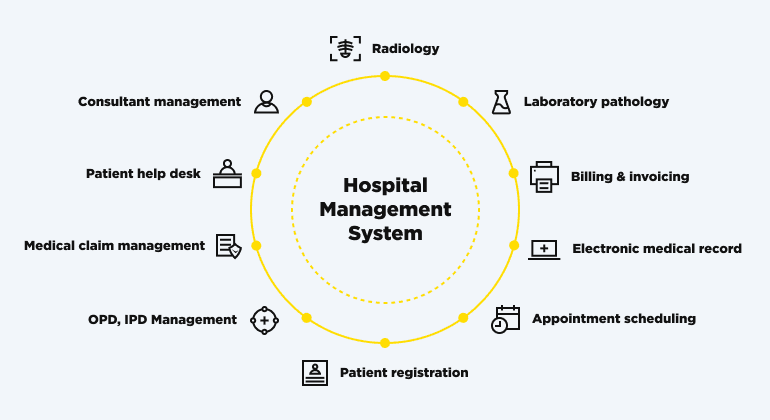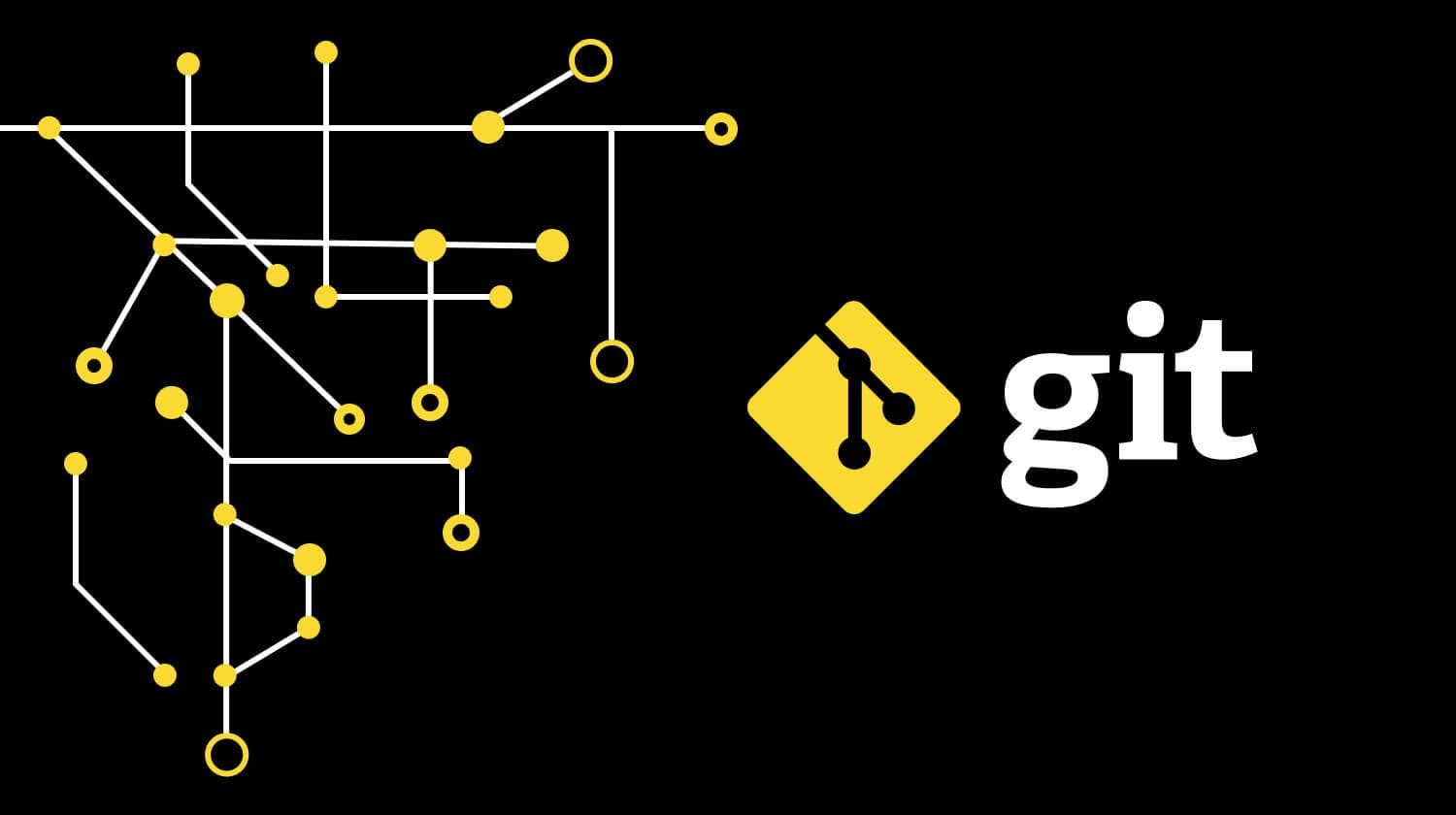Nowadays, it’s crucial to understand the complexities of Hospital Management Systems. You may ask why. The answer is simple. As healthcare evolves, so does the need for efficient management systems. Moreover, the Hospital Management System Software Market is projected to reach multimillion USD by 2031. Let’s discover why, how, and at what cost you may elevate your healthcare business.
How to Develop a Hospital Management System: Guide to Optimizing Your Ecosystem
Technology has been reshaping the healthcare system for years by offering efficient and smart solutions to simplify medical facility management, monitor personal health, or build better communication between patients and physicians. However, finding software solutions to optimize your specific ecosystem is challenging. Read on to learn how to develop a hospital management system that meets your business requirements and powers up your medical business for growth.
Hospital Management System (HMS) Explained
The chance is each of us came across hospital management software at least once in the past year, whether by booking doctor’s appointments online or registering for a walk-in visit at the reception. An HMS is a mix of cloud, web portal, mobile, or desktop applications working together as a seamless system. The HMS goal is to provide tools to automate aspects of managing healthcare facilities and elevate the quality of medical service.
In general, HMS aims to assist medical staff with the management information system in a hospital. Components of the HMS software can vary from one clinic to another and include different features depending on the issues the establishment faces, from an online patient management system and electronic records to inventory supply setup and insurance services integrations.
Hospital Management System Software Types
The type of clinic management system software depends on the functionality set you require to solve internal issues. Based on the essential features, there are four types of HMS:
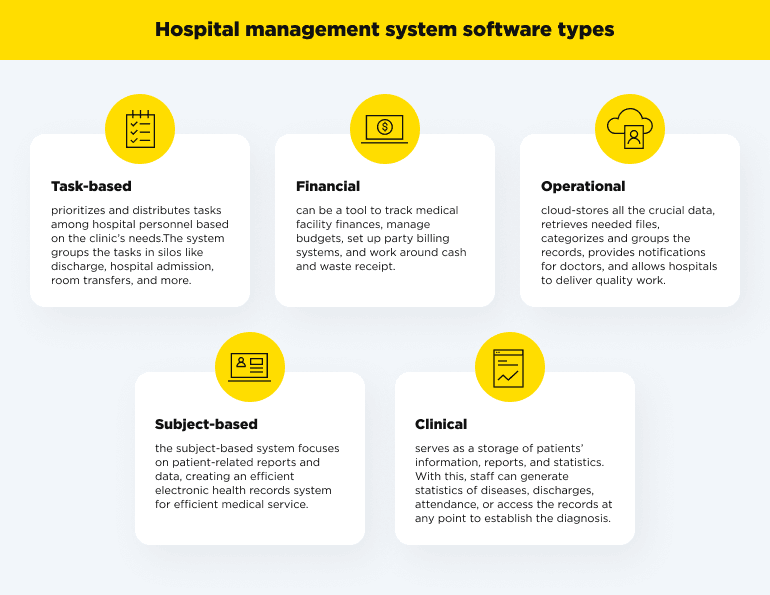
Task-Based HMS Software
The task-centric hospital management system prioritizes and distributes tasks among hospital personnel based on the clinic’s needs. The system groups the tasks in silos like discharge, hospital admission, room transfers, and more.
Financial HMS
Hospital management system software can be a tool to track medical facility finances, manage budgets, set up party billing systems, and work around cash and waste receipts.
Operational HMS Software
Those systems are data-focused and help physicians and medical staff to manage all the health records. It cloud-stores all the crucial data for the healthcare facility, retrieves needed files, categorizes and groups the records, provides notifications for doctors, and allows hospitals to deliver quality work.
Clinical HMS
Clinic management software serves as a storage of patients’ information, reports, and statistics. Using such systems, hospital staff can generate statistics of diseases, discharges, attendance, and more or access the records at any point to establish the diagnosis.
Subject-Based HMS
The subject-based system focuses on patient-related reports and data, creating an efficient electronic health records system for efficient medical service.
How You Can Benefit From Hosptial Management System
A custom hospital management system influences medical specialists’ work and productivity, simplifies clinic services for patients, and optimizes the business of medical facilities as an organization. The Market Research Future revealed that the USA has the highest demand for user-friendly clinical management systems, about 60%. Therefore, let’s take a look at the impressive benefits of hospital management software products:
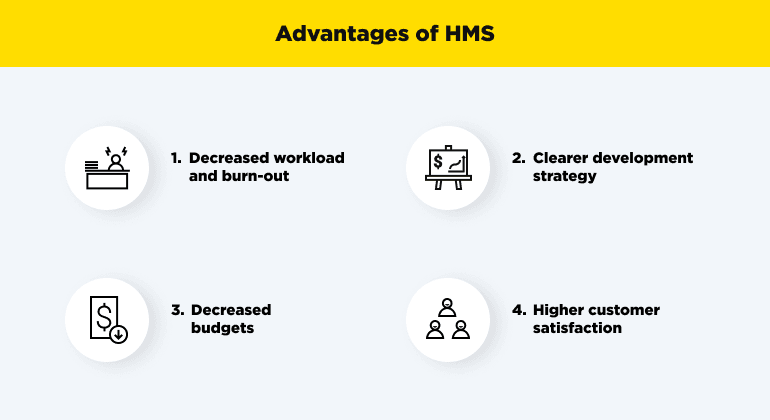
-
The cloud-based clinical management boosts data accessibility, as practicians can retrieve patients’ medical records in a couple of clicks, research health history, provide accurate diagnoses, and create statistical reports. The digital visualization of patients’ data improved diagnosis accuracy by 55%.
-
Digital hospital management solutions reduce human error risks by automating crucial internal processes, like scheduling appointments, managing hospital capacity and workload, storing records, checking the inventory supply, and more.
-
With medical facility automation, there is no need to waste resources on time-consuming administrative tasks.
-
Flexible and scalable HMS products suit small-, middle-, and large-sized hospitals and practicians’ offices, as software can provide solutions for healthcare facilities of any size and grow with the clinic.
-
Compliance and data security are essential for medical offices as they manage patients’ personal health and financial information. HMS products use top-notch technology to guarantee data integrity and protect hospital servers from data breaches, hacker attacks, other cyber threats, or insurance frauds.
-
Custom HMS software improves customer experiences by making medical services digitally accessible with online appointment booking, reminders for necessary visits or medication refills, treatment monitoring, online consultations with practitioners, and many more.
-
Clinic management software boosts doctors’ and medical staff’s productivity by letting their minds off administrative tasks and providing tools for improving patients’ treatments, monitoring their well-being, and more.
-
A multi-module HMS system is a cost-effective tool as it simplifies many work processes and automates manual tasks like billing patients, submitting insurance claims, or generating reports for hospital staff. Therefore, medical facilities can save on extra stuff and protect their employees from overworking.

Ready to build a Healthcare product?
Contact usCore Features To Include in HMS for Full Optimization
The question entrepreneurs or stakeholders have is how to develop a hospital management system that will simplify work cycles and optimize medical services. The answer to it is simple. For your innovation to strike, the HMS should have the following features:
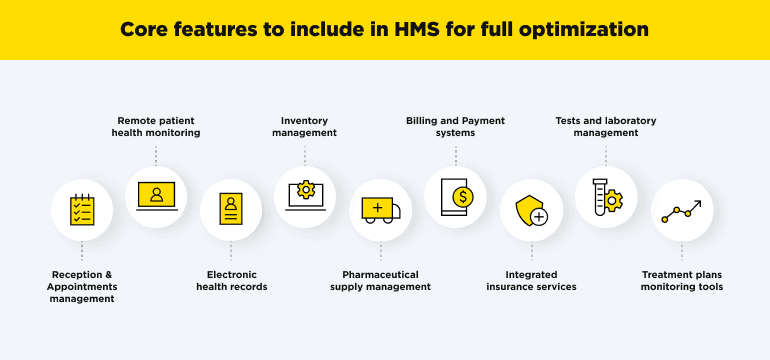
Reception & Appointments management
The medical scheduling software allows the generation of time slots for each medical worker, depending on the duration of their services, and shows availability for various doctors or specific medical equipment. The software automatically can send reminders to users or cancellation notifications to the physician or in-line visitors. Hospitals can ensure that online bookings run smoothly by giving reception access to appointment management.
Remote patient health monitoring
Online patient management system allows the monitoring of patient well-being remotely. By syncing the software with a health-tracking wearable device, doctors can gather basic data or medication intake without having direct access to patients. That optimizes staff efficiency and increases chances of spotting the difference in health faster than regular in-person check-ups.
Electronic health records
Hospital CRMs are widely used to keep electronic health records. EHR systems gather and store all the personal details about patients relevant to medical specialists, like private data, insurance and financial information, family medical records, specific reactions to treatments or medications, and lab results. The EHR feature allows each doctor to be up-to-date with patients’ conditions and previously received medical care. Integrations with third-party laboratories or medical facilities help to keep the complete picture of patient's health records by accessing additional data or treatment history and more.
Inventory management
As part of the management information system in a hospital, it’s crucial to track materials usage and calculate goods in the warehouse to avoid shortages. Healthcare facilities can automate those processes, keeping the clinics well-stocked with inventory management.
Pharmaceutical supply management
The E-prescription feature of the hospital software combines drug inventory management with patients’ medication plans to enhance control over pharmaceutical supply and refill.
Billing and Payment systems
Hospital management system software aims to make the payment process more transparent and clear for patients. With an essential feature, visitors can calculate the price of the services while scheduling an appointment. The system can track patients’ debts and previous financial operations in the hospital, marking those who await the bill. With the payment&billing feature, it will be easy for the reception staff to print out statements and lists of provided services on patients’ demand.
Integrated insurance services
As people use various insurance providers, it’s crucial to have a third-party integration to access the latest information or contact the company if needed. The insurance module stores all relevant data, like policy numbers, company names, contacts, and information about healthcare service policies.
Tests and laboratory management
The healthcare facility needs secure, easy-accessible storage of laboratory analysis reports to provide a profound picture of the patients’ states. The lab&tests module gathers and categorizes all the health tests and provides access to the authorized user only.
Treatment plans monitoring tools
The treatment plan management feature advises physicians on how to treat and examine patients according to the international classification of diseases or customized methodology. With internal knowledge databases, the software can predict the treatment outcome and assist doctors in getting control of the plan and care process.
Process of Hospital Management System Development
How to develop a hospital management system with reliable and robust performance? By following six necessary steps to delivering a highly scalable and responsive product.
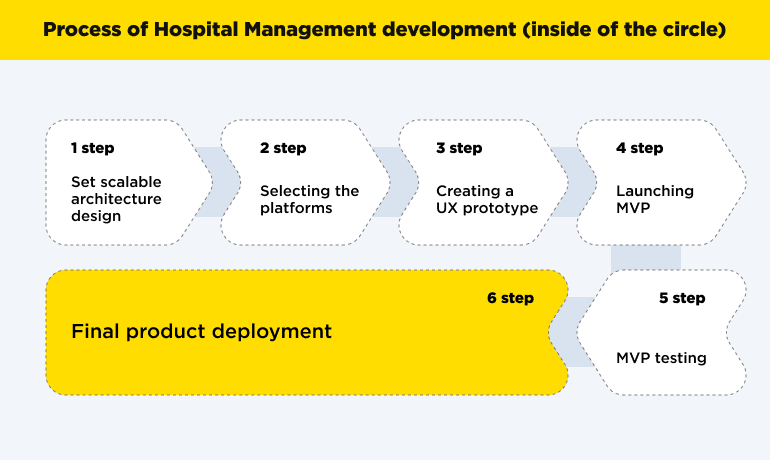
Step 1: Scalable architecture design of hospital management system
HMS web applications or supportive mobile app development require a multi-service approach to hospital management system design and implementation of microservice architecture to synchronize all the components with the central server system. That way, you can flawlessly unite multiple aspects and features for healthcare business optimization to increase user and customer satisfaction. The design of the hospital management system should accommodate higher loads and future growth without compromising performance, ensuring a smooth experience for all users. A well-designed user interface enhances user satisfaction and adoption rates, leading to a positive impact on healthcare service delivery.
Step 2: Selecting the platforms
With comprehensive research, you can determine which platforms your target audience prefers to boost the outreach of your product. In most cases, stakeholders and entrepreneurs use multiple deployment platforms to raise product accessibility and introduce separate applications for medical staff and employees.
Step 3: Creating a prototype
In general, HMS products require complex and multi-level development. However, with accessible modern technologies, you can create several prototypes to test the functionality and efficiency of each module. HMS software supports the work cycles and structure of medical facilities, seamlessly simplifying physicians’ daily lives. Therefore, one cannot compromise UX design in order to cut the development cost, as each module, integration, and feature has to be polished. Yet, the hospitals have no use of stylish visuals. Therefore, it’s crucial to keep the UI design simple and intuitive to assist medical staff on their job without destructive elements.
Step 4: Launching MVP
A minimum viable product is a solution to gather feedback from real-life users and hospital staff to improve user experience, test core features, and validate the concept. In practice, HMS software requires several MVP projects to implement essential features one by one and build complicated yet optimized and flawless systems for a medical facility.
Step 5: Testing
The necessary steps for guaranteeing hospital management software’s robust performance are code and QA testing. To deliver an optimized and flawless HMS system, the professional team performs several QA analyses to check the user experience and functionality performance of each module, integration, and application. Combining those indicators with MVP project results allows developers to polish up the final product and set it up for release.
Step 6: Final product deployment
You have to deploy the HMS software on selected platforms as the development process is successfully finished. The deployment process is a headache for healthcare providers. Therefore, a software development company deals with all release-related aspects, like stress-testing each separate component.
Cost of Building Hospital Management System From Scratch
The final price for hospital management system software depends on the following factors:
- Number of required modules: The complexity of the HMS will be influenced by the number of modules required, such as patient registration, appointment scheduling, billing, medical records, pharmacy management, and more.
- System complexity: The intricacy of the system's functionalities and interactions will impact the development effort and, subsequently, the cost.
- Development time: The timeline for developing the custom HMS will contribute to the overall cost. Longer development periods may lead to higher expenses.
- The need to use business analytic services before production: Utilizing business analytic services before production can add to the development cost, but it can provide valuable insights and optimizations.
- Deployment platform for HMS product: The choice of deployment platform, such as on-premises or cloud-based, will affect the cost and maintenance requirements of the HMS product.
- Rates of the partnering development company: The rates charged by the partnering development company will directly influence the project's overall cost.
Due to the unique nature of each HMS project, providing an exact cost estimate is challenging. On average, custom hospital management software development costs around $500,000, while the initial Minimum Viable Product (MVP) can cost approximately $200,000.
The cost range also depends on the specialists involved and the development stages required. Let’s figure it out.
If you need product discovery services, depending on your project, you may expect the range: 1) small projects of 20-30 hours - up to $1500, 2) middle-sized projects that require 40-60 hours - $2000-3500, 3) large-scale projects of 70-120 hours - $3500 and up to $10000.
The UI/UX design services allow for 25-50 hours of work for small projects with the cost of $1100-2500, 6-120 hours for middle-sized projects - between $2500-6000, and 100-300 hours for large-scale projects that may cost $5000-15000.
The cost to develop a hospital management system for small projects (total development hours 150-200 hours) is estimated at $6000-10000; for middle-sized projects (200-450 hours) - $12000-25000, and for large-scale projects (500-1500 hours) - $25000-67500.
The QA part for small projects is estimated to be up to $1500, $1500-3500 for middle-sized projects, and up to $3500 for large-scale projects.
If these prices exceed your budget, an alternative approach is to outsource the development service to Central or Eastern European companies. Outsourcing allows you to achieve high-quality results while potentially reducing development costs. Moreover, outsourcing provides access to cutting-edge technology and innovative approaches to HMS solutions, enhancing the final product's overall competitiveness.
Keep in mind that the hospital management software cost can vary widely depending on the scope of the project, the specific requirements, and the capabilities of the development team.
It is essential to collaborate closely with the development company to ensure that the final HMS aligns with your organization's needs and budget constraints.
Wrapping Up
Developing an HMS (Hospital Management System) is an essential part of moving towards enhanced efficiency, improved patient care, and seamless operations. When it is tailored to your healthcare business needs and requirements, you can significantly upgrade your medical facility to thrive in the modern healthcare industry.


